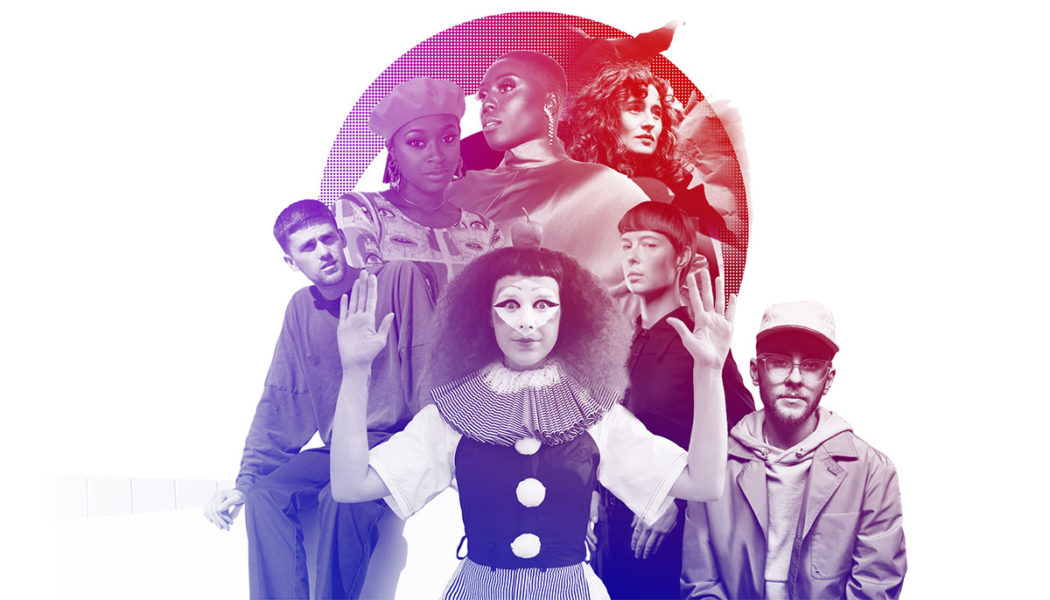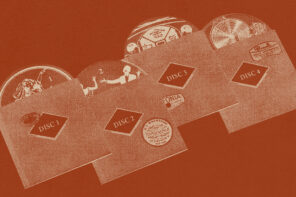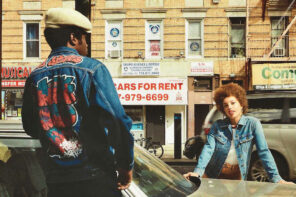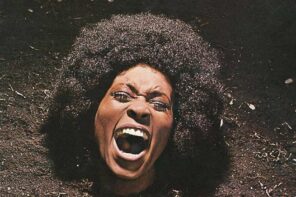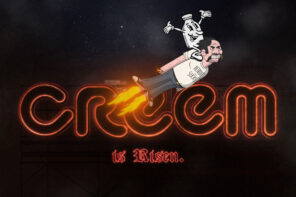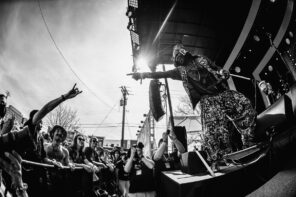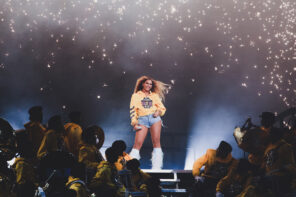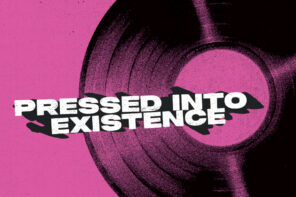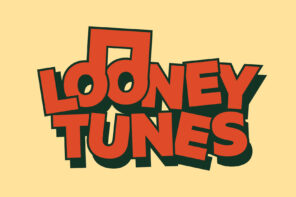Working on an album from home, an interview with artist Jess Joy.
Mixing it up. Troy Farmer of Raven + Crow Studio kicks off installement numero uno of Mixtape Interviews—every month or so sitting down to chat with a new artist from the mix.
I first met Jess Joy years back, shortly after she and her then musical + life partner, Andrew Martin (Palaye Royale), had made the move from relatively sleepy Baton Rouge to the hustle and bustle of Los Angeles. We all quickly bonded over our mutual veganism, but what really struck me was the unmistakable creativity behind the pair, especially after I first saw their band, Moon Honey, perform live. Not only was their beautifully distinct brand of psych-prog-pop hard to pin down, but that same telltale creative spirit breathed a distinct visibility into their performances, with wildly winding guitar lines, near-dancing energy, and sets and outfits that screamed as loudly as their music did.
But ever-piercing through all of that was always Jess’ voice—a soaring warble that created a throughline to Moon Honey’s sound, regardless of the sonic territory the instruments explored.
Moon Honey sadly came to an end in 2019, so it was with renewed excitement that I saw Jess had embarked on a solo career in music, no less with a full-length debut on one of my favorite labels, Joyful Noise Recordings.
I recently took some time to catch up with Jess to talk about her debut solo album, PATREEARCHY, its namesake, patriarchy, and some of her upcoming creative work outside the music realm.
Troy: I love Joyful Noise. I was so psyched to hear that you are on that label.
Jess Joy: I love them too. Thank you. I’ve been sending—Karl is the name of the record label founder—I’ve been sending him Moon Honey demos for 10 years. It was really a surprise that this was the stuff that he was interested in. I was super stoked, they’re just a bunch of music dorks and it’s just fun to be in a group of people who are into the weird things.
Troy: Yeah, the good weird things.
Jess Joy: And putting out a record during a pandemic, too, that was really surprising. It’s not a time period where everybody was making a lot of money off of… Well, maybe some people were…but you can’t street promote or anything. The record label thought of it as music as medicine and not as a product, at that moment, just being generous and sharing.
Troy: I think we all saw how creative people had to get—artists had to get—to do anything, so many of these virtual performances. I’m sure some people made some money off of them, but it’s not regular touring. That’s how you make money as an artist these days. But for a while there, and even now, I’ll take anything I can get. We went to a bluegrass festival yesterday because it was something we could do.
Jess Joy: I need to get into some bluegrass.
Troy: I think that would be awesome if you got into bluegrass.
How is it now? Does it seem like there’s a light at the end of the tunnel? Are you planning shows?
Jess Joy: Not at the moment. I know many people who are, but I’m about to go on a three-month adventure, so when I get back, hopefully maybe shows will be popping again. I don’t know. It’s so much, the first wave of people performing again. But I’m going to a residency in Poland in July.
Then I’m going to be in Berlin and then I’m doing an apprenticeship—sort of woodworking—in Carrizozo, New Mexico for a month. I’m doing this building internship for a month, so basically just spending some time doing other stuff, and then back to music.
Troy: Is it mostly visual arts? Is it miming?
Jess Joy: Well, actually, at the residency I am going to give a mime workshop, and I think I might be making a music video or something….
It could be visual. I don’t know, it’s very open-ended. The woodworking and stuff is all pretty much visual art.

Troy: That’s awesome. Getting back to the album again, I knew your work from Moon Honey, obviously, which I kind of assume was much more of a collaborative effort. Is this very much a solo record? Did you write with someone, or is this just all you?
Jess Joy: It’s kind of a mixture—so eight of them I wrote and then brought in friends to play on, and then two of them were kind of leftover songs between me and Andrew (Martin, of Moon Honey) that I finished and put out. Two were co-written, but yeah for the most part it was stuff that I either just had to play around with for a long time, or that came up with around the pandemic area, and I was writing an album with my friend Mike Burn. Things just kind of dropped off, because we wanted it to be this certain quality.
The pandemic happened—at that point, I was kind of like, you can just do your own thing. It doesn’t have to sound amazing, you can just record most of it in your bedroom. That’s how these songs ended up being finished, yeah.
Troy: It’s interesting how many artists were just like, alright I guess I’m going back to recording at home, what I did maybe at the beginning of my career or when I was first getting started. I can think of so many artists that started out doing that, I feel like sometimes you can tell who has, but a lot of times the technology is so good. Sometimes I can’t even tell, which is a great thing. Not that I want recording studios to go out of business or anything, but in so many ways, this pandemic, even outside of the arts, has proven to so many people that there are a bunch of different ways to do things and that’s all right. Maybe better than alright—it’s cool.
I saw my experiences in the context of the patriarchy and what that meant.
Jess Joy: Totally. It’s super empowering because that can be such a thought-limiter, you know? A block, that I can’t make something because I don’t have money. Then you realize, yeah you can, it would just mean different quality. Yeah, just really not as many barriers as we think there are.
Troy: The spelling of the album—can you talk about why it’s named that or why it’s spelled that way?
Jess Joy: Yeah, so PATREEARCHY—spelled with the ‘tree’—once I was finished with the whole album and I was going through the songs, there were a lot of mentions of roots and fruits and the seasons. It was also a lot of my experiences of being in the role of a woman, and so I saw my experiences in the context of the patriarchy and what that meant. What are the roots and the fruits of patriarchal culture? One that is a rape culture, or objectifies women, what is it as being a woman inside of that?
I also thought it was just fun to make something so serious, the word patriarchy—it makes it kind of cute.
Troy: Yeah, totally. I wasn’t sure if it had something to do with the song on there, “thrashold,” too. If I remember right, before the album came out, that was one of the earlier ones you released. I was wondering “Is this all going to have some sort of weird spelling kind of stuff?”
Jess Joy: It was super fun, I tried to play with words.
Troy: That’s cool. You’re doing well, personally?
Jess Joy: Yeah, totally. I appreciate being able to talk about the record. Doing a solo record wasn’t anything I thought was going to happen, it was a kind of, “I could never do that,” vibe. I had thought when Moon Honey ended, I was like, that’s it. I better find a new hobby, because that’s not going to happen again. It just surprised me—music is this force that carries itself and I’m really glad to keep being able to be a conduit for whatever it is, you know?
Troy: It really is. I was excited to listen to the album. Obviously, your voice is a through-line with Moon Honey, but they’re just such different songs in such a surprising, cool way.
Jess Joy: Now for something different.
Troy: Yeah, in a great way. I don’t know, I feel like there are artists that strike out on a solo career, this is basically what they were doing with a band. It’s always exciting to see when you take away these other voices in this collaborative effort what the singular voice sounds like. What that creates, what that person creates—it’s always interesting to see when it is something so very different.

